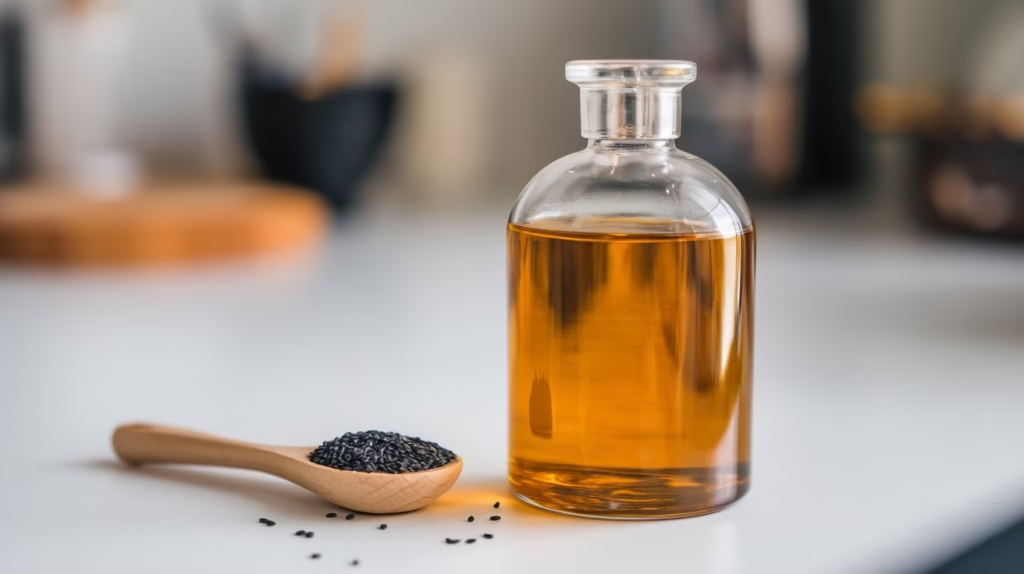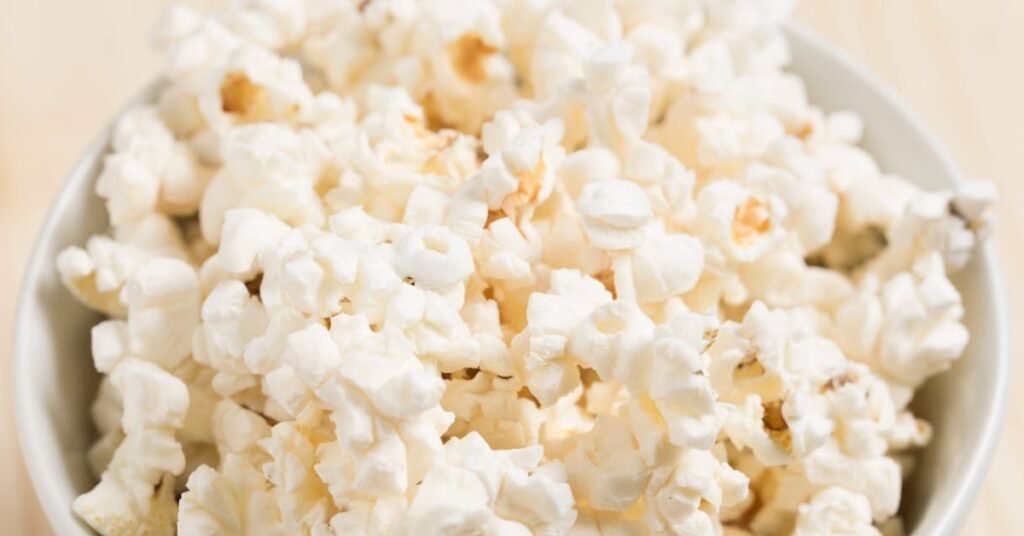Lately, I keep seeing black seed oil everywhere, in blogs, social media, and health podcasts. I first discovered black seeds thanks to Dr. Michael Greger. I use them in curries and stews as they have this great property flavor and complement most of the winter dishes. But as I’ve been eating more salads, I’ve found myself using them less and wondered: is black seed oil an easier and more potent option? Should I swap to using it as a supplement rather than trying to remember to incorporate black seeds in my food? Let’s break down all the benefits of black oil.
Why Black seed oil is unique?
Black seed (Nigella Sativa) oil or black cumin seed oil is a great source of essential fatty acids, tocopherols, phytosterols, polyphenols, essential oils, and other bioactive compounds. However, the main active ingredient in black seed oil that makes it so special is thymoquinone. Studies suggest that thymoquinone, has health benefits including anti-inflammatory, antioxidant, anticancer, neuroprotective, and renal protective effects, as well as potential benefits in treating diabetes, cardiovascular disorders, and viral infections.(1)(2)(3)
These are what make black seed oil such a powerful natural remedy:
| Compound | Benefits |
|---|---|
| Thymoquinone | Antioxidant, anti-inflammatory, antimicrobial, liver-protective |
| Nigellone | Antihistamine helps with respiratory issues |
| Beta-sitosterol | Supports cholesterol balance |
| Carvacrol & thymol | Antimicrobial, antifungal |
| Essential fatty acids | Omega-6 (linoleic acid) and Omega-9 (oleic acid) |
Like with many all-natural compounds that can not be patented and not much profit extracted, black seed oil consumption human studies are limited, but there are still many proven benefits.
10 Health Benefits of Black Seed Oil:
1. Antioxidant and Anti-inflammatory Properties.
A small randomized controlled trial suggests that black seed oil shows antioxidant and anti-inflammatory properties, which can improve conditions such as COPD (chronic obstructive pulmonary disease)(4)
2. Respiratory Health.
Another randomized control trial showed that consuming black seed oil significantly decreased upper-respiratory tract complaints and improved psychological mood in long-distance runners (5)(4)
3. Metabolic Health.
Some studies suggest that black seed oil may improve metabolic health by reducing insulin resistance and lipid profile, and by decreasing HbA1c levels and oxidative stress, although some studies suggest that its effects on certain metabolic parameters may not be statistically significant, so we need more human studies. (6)
4. Immune System Support.
Black cumin seed oil extract may improve immune system vigilance and overall well-being following the stress of endurance training and competition. (5)
5. Cardiovascular Health.
It may improve cardiovascular health by reducing total cholesterol, LDL cholesterol, triglycerides, and inflammation. (3)
6. Digestive Health.
Black seed oil can be good for your digestion. It may help food pass smoother through your system, reduce gas and bloating, and protect your stomach by adding a layer of mucus to the stomach lining and lowering stomach acid. (9)
7. Skin and Hair Health.
Promotes healthy skin and may help with acne, eczema, and hair growth(3)(8).
8. May Have Anti-Cancer Properties.
Black seed oil, especially its main active ingredient thymoquinone, may help fight cancer. It works by helping to kill cancer cells, slowing down their growth, and affecting the way cells send signals to each other. These effects have been seen in several types of cancer, such as breast (10), colon, liver, lung, and skin cancer, although, most of the studies are animal or in vitro so we do need human studies to support this. (11)
9. Managing Diabetes.
It may help manage diabetes by lowering blood sugar, improving bodies response to insulin, and supporting healthier cholesterol levels. It could be a helpful add-on to support regular diabetes medications.(7)(12)
10. Improves Liver Health.
One study shows that taking 2 grams of black seed daily, along with lifestyle changes, helped improve insulin resistance and reduce liver fat in people with NAFLD better than lifestyle changes alone. (7)
Does Black Seed Oil Help With Weight Loss?
Yes, but we need more human studies focusing on this question. It’s not Ozempic, but it’s a safe, supportive supplement to include alongside diet and lifestyle changes.
Although a study involving menopausal women, black seed powder didn’t lead to significant weight loss, it did improve cholesterol levels, blood sugar, and heart health markers.(13)
A New meta-analysis of randomized controlled trials found that black seed oil may support modest weight loss. On average, participants lost about 1.5 kg (3.3 lbs) and saw a small drop in BMI of around 0.6 kg/m². While there were no major changes in waist, hip size, or waist-to-hip ratio overall, certain groups, such as people over 45 or those with type 2 diabetes, experienced slight reductions in waist size. The study also found that longer use (more than 8 weeks) led to better results, and the oil form was more effective than capsules or powder, likely due to its higher concentration of thymoquinone. (15)
If you like the benefits and would like to include good quality black seed oil in your daily routine, Check out:
Best Black Seed Oil Brands in 2025: Quality, Potency, and What to Look For
How to Use Black Seed Oil Safely
Always talk to your healthcare provider before adding any supplement to your routine. Black seed oil is generally safe in small amounts, but it’s not recommended during pregnancy or breastfeeding. It can also interact with medications.
In rare cases, large doses have caused serious side effects. One report linked a high intake of black seed oil over a month to muscle breakdown and kidney issues (14). Stick to recommended dosages and follow label instructions carefully.
What is the best time to take black seed oil?
Ideally, you should take black seed oil with your meal as it can cause mild nausea or heartburn on an empty stomach, especially in liquid form. You should start seeing benefits the most after taking it daily for at least 8 weeks. It is also important to look at the form, oil form is better as usually it contains higher levels of the active compound thymoquinone.
How much black seed oil should I take daily?
Always read the label or consult with your healthcare provider to see what is the best amount. Do not exceed the recommended amount on the label.
Oil (liquid form):
1 to 2 teaspoons per day (approx. 5- 10 ml)
Usually gives around 25 – 90 mg of thymoquinone (TQ) if the oil has 0.5%–1.5% TQ content.
Capsules:
500 mg to 1000 mg per capsule, taken 1 to 2 times a day. A good quality black seed oil capsule should contain 5–10 mg of TQ per dose.
Summary
Black seed oil is a powerful natural remedy with science-backed benefits, from supporting the immune system to improving heart and liver health. Still, it’s not a miracle cure. Used wisely and alongside a healthy lifestyle, it can be a helpful addition to your wellness routine.
Have you tried black seed oil and seen the benefits? Share your experience in the comments!
Please Note: This post is for informational purposes only and is based on research. It’s not medical advice. It’s always best to consult a healthcare professional with health concerns. Enjoy reading!
References
1.Mazaheri, Y., Torbati, M., Azadmard‐Damirchi, S., & Savage, G. (2019). A comprehensive review of the physicochemical, quality and nutritional properties of Nigella sativa oil. Food Reviews International, 35, 342 – 362. https://doi.org/10.1080/87559129.2018.1563793.
- Kohandel, Z., Farkhondeh, T., Aschner, M., & Samarghandian, S. (2021). Anti-inflammatory effects of thymoquinone and its protective effects against several diseases.. Biomedicine & pharmacotherapy = Biomedecine & pharmacotherapie, 138, 111492 . https://doi.org/10.1016/j.biopha.2021.111492.
- Rahim, M., Shoukat, A., Khalid, W., Ejaz, A., Itrat, N., Majeed, I., Koraqi, H., Imran, M., Nisa, M., Nazir, A., Alansari, W., Eskandrani, A., Shamlan, G., & Al-Farga, A. (2022). A Narrative Review on Various Oil Extraction Methods, Encapsulation Processes, Fatty Acid Profiles, Oxidative Stability, and Medicinal Properties of Black Seed (Nigella sativa). Foods, 11. https://doi.org/10.3390/foods11182826.
- Al-Azzawi, M., Abozaid, M., Ibrahem, R., & Sakr, M. (2020). Therapeutic effects of black seed oil supplementation on chronic obstructive pulmonary disease patients: A randomized controlled double blind clinical trial. Heliyon, 6. https://doi.org/10.1016/j.heliyon.2020.e04711.
- Talbott, S., & Talbott, J. (2022). Effect of ThymoQuin Black Cumin Seed Oil as a Natural Immune Modulator of Upper-Respiratory Tract Complaints and Psychological Mood State.. Food Science & Nutrition Research. https://doi.org/10.33425/2641-4295.1057.
- Rachman, P., , A., & Darmawan, E. (2017). The efficacy of black cumin seed (Nigella sativa) oil and hypoglycemic drug combination to reduce HbA1c level in patients with metabolic syndrome risk. IOP Conference Series: Materials Science and Engineering, 259. https://doi.org/10.1088/1757-899X/259/1/012018.
- Darand, M., Darabi, Z., Yari, Z., Hedayati, M., Shahrbaf, M., Khoncheh, A., Hosseini-Ahangar, B., Alavian, S., & Hekmatdoost, A. (2019). The effects of black seed supplementation on cardiovascular risk factors in patients with nonalcoholic fatty liver disease: A randomized, double‐blind, placebo‐controlled clinical trial. Phytotherapy Research, 33, 2369 – 2377. https://doi.org/10.1002/ptr.6424.
- Farhan, N., Salih, N., & Salimon, J. (2021). A REVIEW ON OLIVE OIL AND Nigella sativa L. BLACK CUMIN SEED OIL: COMPOSITION AND BIOLOGICAL ACTIVITY. Rasayan Journal of Chemistry. https://doi.org/10.31788/rjc.2021.1446525.
- Nautiyal, O. (2019). Black Seed (Nigella sativa) Oil. Fruit Oils: Chemistry and Functionality. https://doi.org/10.1007/978-3-030-12473-1_46.
- Baig, W., Alwosaibai, K., Al-Jubran, K., Chaudhry, T., Al-Dowish, N., Alsaffar, F., & Alam, M. (2022). Synergistic anti-cancer effects of Nigella sativa seed oil and conventional cytotoxic agent against human breast cancer. Drug Metabolism and Personalized Therapy, 37, 315 – 321. https://doi.org/10.1515/dmpt-2021-0229.
- Gali-Muhtasib, H., Roessner, A., & Schneider-Stock, R. (2006). Thymoquinone: a promising anti-cancer drug from natural sources.. The international journal of biochemistry & cell biology, 38 8, 1249-53 . https://doi.org/10.1016/J.BIOCEL.2005.10.009.
12.Heshmati, J., & Namazi, N. (2015). Effects of black seed (Nigella sativa) on metabolic parameters in diabetes mellitus: a systematic review.. Complementary therapies in medicine, 23 2, 275-82 . https://doi.org/10.1016/j.ctim.2015.01.013.
13. Ibrahim RM, Hamdan NS, Ismail M, Saini SM, Abd Rashid SN, Abd Latiff L, Mahmud R. Protective Effects of Nigella sativa on Metabolic Syndrome in Menopausal Women. Adv Pharm Bull. 2014;4(1):29-33. doi: 10.5681/apb.2014.005. Epub 2013 Dec 23. PMID: 24409406; PMCID: PMC3885365.
14. Şener, K., Çakır, A., Yesiloglu, O., Altuğ, E., Guven, R., & Korkut, S. (2024). Rhabdomyolysis and Acute Kidney Injury After Consumption of Black Seed Oil.. Toxicon : official journal of the International Society on Toxinology, 107787 . https://doi.org/10.1016/j.toxicon.2024.107787.
15. Navid Naghsh, Amir Hossein Moridpour, Zeynab Kavyani, Vali Musazadeh, Jaber Jafarzadeh, Ehsan Safaei, Cain C.T. Clark, Amir Hossein Faghfouri,
The effect of Nigella sativa (black seed) supplementation on body weight and body composition: A GRADE-assessed systematic review and dose-response meta-analysis of randomized controlled trials, Journal of Functional Foods,Volume 105,2023,105565, ISSN 1756-4646, https://doi.org/10.1016/j.jff.2023.105565.
Silvija Meilunaite, PN1-NC, CSMC, is a certified nutrition and menopause coaching specialist who writes about midlife health, nutrition, and evidence-based wellness. She focuses on research-driven approaches to feeling better in your 40s and beyond, with a special interest in low-tox living and supportive daily habits.
- This author does not have any more posts.





